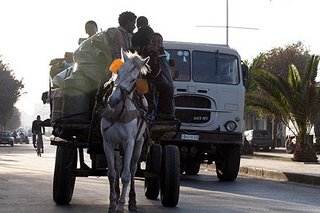 For 30 years Eritreans sacrificed their lives as well as those of their sons and daughters to fight for independence from their larger neighbor, Ethiopia.
For 30 years Eritreans sacrificed their lives as well as those of their sons and daughters to fight for independence from their larger neighbor, Ethiopia.Five years after Eritrea's 1993 independence, the two countries went to war - this time over their disputed 1,000-kilometer border that was never officially demarcated during t
 he decades they existed side by side.
he decades they existed side by side.The guns are silent now, but tensions remain high since the border dispute has not been resolved because Ethiopia rejected in 2003 to let an independent border commission to demarcate their border.
Ethiopia was unhappy that the commission had awarded the disputed town of Badme, the flashpoint of their 1998-2000 border war, and other territories to Eritrea. The commission was set up under the countries' 2002 peace agreement under they both agreed in advance that its border ruling will be final and binding.
Eritrea has criticized Ethiopia's attempts to overturn the ruling as attempts to shift the goal post after the rival side has scored a goal.

The Red Sea state has pressed the United Nations, the U.S., European Union and other countries to use their economic might to press Ethiopia - that receives some $1.9 billion in humanitarian and development aid annually - to respect the peace agreement and resolve the border dispute conclusively.
I traveled to Eritrea recently to see the impact of the unresolved border dispute on the country's economy and lives of people in the boundary, where heavily-armed militiamen from the two countries watch the movements of the other with suspicion.
I traveled by road around the mountainous nation, whose narrow Red Sea coastal plain is one of the hottest and driest places in Africa. The cooler central highlands, where the capital lies, have fertile valleys that support agriculture.
 THIS IS NO SIMPLE DISPUTE
THIS IS NO SIMPLE DISPUTEThe Eritrea-Ethiopia border dispute is not a simple border dispute.
For Eritrea, the land dispute is a matter of national pride and the ultimate assertion of independence. Many Ethiopians still do not accept Eritrea's independence, and some writers have claimed that politicians see the loss of Badme could exact a hefty political price at the ballot box.
Eritrean officials, however, have consistently pointed out that the border ruling was based on a study of boundaries set by colonial rulers as well as arguments presented by lawyers for the two
 countries.
countries.They warn that Ethiopia's refusal to respect their peace treaty and the ruling of the international arbitrators would set a dangerous precedent for other African countries that have recently signed agreements to end internal and international conflicts.
THE ROOTS OF IT ALL
Ethiopia and Eritrea were separate entities for decades until 1952, when a U.N. resolution joined them in a federation over Eritrean objections. In 1962, Ethiopian Emperor Haile Selassie annexed Eritrea, sparking the Eritrean fight for independence.
Eritrea gained independence in 1993, but its 1,000-kilometer border with Ethiopia was never officially demarcated. The two Horn of Africa nations went to war over the border in 1998, fighting for 2 1/2 years until they signed a cease-fire and peace agreements in Algeria in 2000.